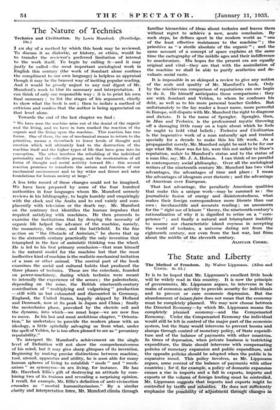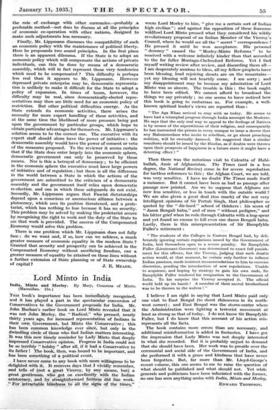The State and Liberty
The Method of Freedom. By Walter Lippmann. (Allen and Unwin. 4s. 6d.)
IT is to be hoped that Mr. Lippmann's excellent little book will be widely read in this country. It is now the principle of governments, Mr. Lippmann argues, - to intervene in the realm of economic activity to provide security for individuals and to prevent or cure economic depression. • But the abandonment of laissez-faire does not mean that the economy must be completely planned. We may now choose between the Directed Economy-by which Mr. Lippmann means the completely planned economy—and the CoMpensated Economy. Under, the Compensated Economy the individual would still be left in control of the major part of the economic system, but the State would intervene to prevent bOoms and ,slumps through control of monetary policy, of State expendi- ture and of the balance of payments with other countries. In times of depression, when private business is -restricting expenditure, the State should intervene with compensating policies of monetary expansion and public expenditure, 'and the opposite policies should be adopted when the public is in expansive mood. This policy involves, as Mr.- Lippmaim argues, some control of the balance of payments with other countries ; for if, for example; a policy of domeitic expansion .causes a rise in impOits and a fall in exports, imports and exports or the volume of foreign lending must be controlled.
Lippmann suggests that imports and exports might be controlled by tariffs and Subsidies'. He does not sufficiently emphasize the POSSibility of adjustment through changes in
the rate of exchange with other currencies=probably .a preferable method—not does he discuss at all the principles of economic co-operation with other nations,. designed to make such adjustments less necessary.
. Finally, Mr. Lippmann discusses the compatibility of such an economic policy with the maintenance of political liberty. Here he propounds two sound principles. In the first place there is an apparent dilemma. If the State is to adopt an economic policy which will compensate the actions of private
individuals, can this be done by means of a democratic assembly, which will in fact represent those very tendencies which need to be compensated ? This difficulty is perhaps less real than it appears to Mr. Lippmann. However depressed private enterprise may be, democratic representa- tion is unlikely to make it difficult for the State to adopt a policy of expansion. In times of boom, however, the difficulty may be real, since democratically-elected repre- sentatives may then see little need for an economic policy of restriction. But other political difficulties emerge. As the State extends its economic activities, there arises the necessity for more expert handling of these activities, and at the same time the likelihood of more pressure being put upon the government by particular groups, which hope to obtain particular advantages for themselves. Mr. Lippmemn's solution seems to be the correct one. The executive with its expert staff should alone have the power of initiative : the democratic assembly would have the power of consent or veto of the measures proposed. To the reviewer it seems certain that if the State does enter largely into the economic sphere, democratic government can only be preserved by these means. Nor is this a betrayal of democracy ; to be efficient in the economic sphere the executive must have large powers of initiative and of regulation ; but there is all the difference in the world between a State in which the actions of the government are submitted to the criticism of a democratic assembly and the government itself relies upon democratic re-election, and one in which these safeguards do not exist. Secondly, Mr. Lippmann argues that Fascist dictatorships depend upon a conscious or unconscious alliance between a plutocracy, which sees its position threatened, and a prole- tariat, which has nothing to lose because it has no security. This problem may be solved by making the proletariat secure by recognizing the right to work and the duty of the State to see that work is provided. The success of the Compensated ,F.ponomy would solve this problem.
There is one problem which Mr. Lipppnann does not fully face do we want and, if so, how can we achieve, a much greater measure of economic equality in the modern State ? Granted that security and prosperity can be achieved in the Compensated Economy without sacrificing freedom, can a greater measure of equality be attained on these lines without a further extension of State planning or of State ownership







































 Previous page
Previous page